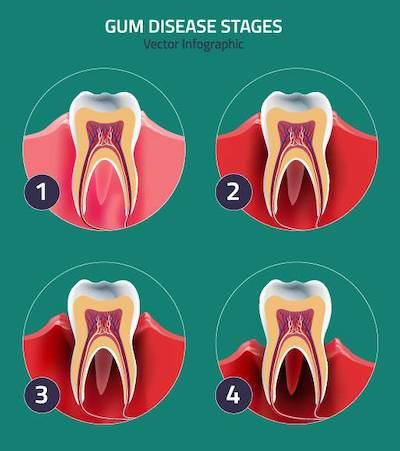
Gum disease, also called periodontal disease, is a severe oral health complication that can lead to tooth loss and even physical health ailments involving the heart and lungs. Studies associate advanced gum disease (periodontitis) with Alzheimer’s disease, diabetes complications, and even low birth weight.
Fortunately, regular dental checkups can spot gum disease in the early gingivitis stage when it is still curable. Allowing gingivitis to advance to full gum disease or periodontitis means the condition is merely treatable.
Stages of Gum Disease
Gingivitis
In this stage, you may not have many symptoms, or they may be so mild that you dismiss them. In the gingivitis stage, you may notice bleeding gums when you brush and floss, mild gum inflammation, and tooth sensitivity.
Mild to Moderate Gum Disease
In this stage, your dentist can restore much of your oral health with gum disease treatment and lower your risks for the associated complications.
Symptoms may include bleeding gums when brushing and flossing, red and irritated gums, loose and mobile teeth, and bad breath.
Advanced Periodontitis
In this stage, you may experience all the symptoms of gingivitis and moderate gum disease, but also looser teeth and even tooth loss. You may notice an elongated appearance to the teeth as the gums recede and pocket where bacteria has collected.
 How Your Lincoln, NE, Dentists Can Diagnose and Treat Gum Disease
How Your Lincoln, NE, Dentists Can Diagnose and Treat Gum Disease
We recommend regular checkups and teeth cleanings to lower your risk of developing gum disease. You should see your dentist every six months. Additionally, be sure to brush and floss at least twice daily. And stop smoking and using tobacco products.
Your dentist can diagnose gum disease based on symptoms and through an examination of your gums.
Treatment may include any of the following:
- A prescribed at-home oral hygiene routine
- Deep cleaning in our dental office
- Topical antibiotics
- Oral surgery
Contact Antelope Creek Family Dentistry for Gum Disease Treatment
If you have gum disease, we are here to help. We hold no judgments; our only mission is to restore you to better oral health. Call today to learn more.
